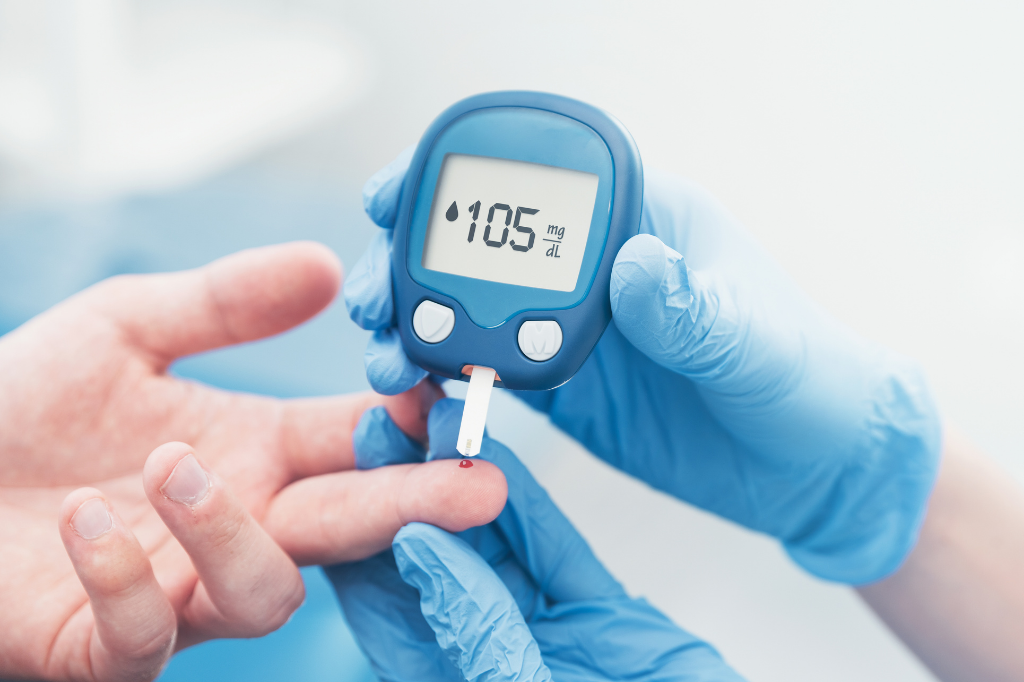
- 17 March 2023
- 0 comments
- 1 Wyświetlenie
Diabetes, is a disease that affects millions of people worldwide and, according to research, this number continues to rise. Although diabetes is a disease that can be controlled and treated, its side effects, such as damage to the kidneys, heart and blood vessels, lead to serious health consequences. In this context, the introduction of cannabidiol (CBD) as a non-toxic, side-effect-free and, above all, natural potential treatment for diabetes is intriguing. Traditional medications used to treat diabetes include insulin, oral medications and diet, but often patients seek alternatives to such treatment precisely because of the nagging side effects regarding traditional medications. Therefore, in recent years, the growing popularity of the cannabinoid cannabidiol (CBD) as an alternative diabetes drug has attracted the attention of researchers and patients. CBD has become the subject of many scientific studies in recent years, which have shown that the compound can help stabilise blood sugar levels, as well as having analgesic and anti-inflammatory effects, and yes it has shown the ability to increase insulin production, which is key to maintaining stable blood sugar levels in diabetic patients. In the following paragraphs, we will find out how CBD works for diabetes, which CBD oil to choose for diabetes and how to sotosos CBD oil for diabetes.
What is diabetes?
Let's start with what diabetes is. Diabetes, often referred to as diabetes mellitus, is a metabolic disease characterised by elevated blood glucose levels, known as hyperglycaemia. Hyperglycaemia is caused by a lack of or insufficient production of insulin by the pancreas or a lack of tissue sensitivity to insulin, leading to impaired glucose metabolism. Diabetes can lead to serious health complications such as heart disease, kidney disease, vision problems and even limb amputations. However, proper diabetes treatment, including lifestyle changes and medication, can help control blood sugar levels and reduce the risk of complications. Diabetes is one of the most common metabolic disorders worldwide and affects both children and adults.
There are three main types of diabetes:
Type 1 diabetes: It is a type of diabetes resulting from insufficient insulin production by the pancreas. When this happens, the immune system attacks and destroys the cells that produce insulin, leading to a lack of the hormone. Type 1 diabetes usually develops in children and young adults, but can occur at any age.
Type 2 diabetes: It is a type of diabetes that develops when the body cannot effectively use the insulin that the pancreas produces. As a result, blood glucose levels rise. Type 2 diabetes is most commonly diagnosed in people over the age of 40 and is strongly associated with obesity and physical inactivity.
Gestational diabetes: This is a type of diabetes that develops in some women during pregnancy. In this case, blood glucose levels rise but usually return to normal after delivery. However, women with gestational diabetes are more likely to develop type 2 diabetes in the future.
How does CBD work for diabetes?
CBD acts on diabetes by influencing a number of factors, mainly by:
- Regulation of blood sugar levels: CBD affects glucose metabolism and homeostasis in the body. Studies show that CBD can lower blood glucose levels by affecting the production of insulin and glucagon, hormones that regulate blood sugar levels. In studies on mice with type 1 diabetes, CBD was found to reduce blood glucose levels by increasing insulin secretion by pancreatic beta cells. At the same time, CBD can increase the cells' sensitivity to insulin, which contributes to better blood sugar regulation.
- Reduction of inflammation: CBD has anti-inflammatory effects that can help protect the beta cells of the pancreas from damage caused by inflammation. Inflammation is one of the main risk factors for the development of diabetes, and leads to damage to pancreatic beta cells, which can lead to increased blood sugar levels. CBD acts on the cannabinoid receptors CB1 and CB2, which are present in the human immune system, while inhibiting the production of pro-inflammatory cytokines. In this way, CBD can reduce inflammation in the body and help control the symptoms of diabetes.
- Improving immune system function: CBD helps regulate the immune system by reducing oxidative stress and increasing antioxidant production. Oxidative stress is a process in which reactive oxygen species cause damage to cells. CBD exhibits antioxidant activity, thus protecting the beta cells of the pancreas from oxidative stress damage.
- Reduction of symptoms associated with diabetes: CBD helps to reduce symptoms associated with diabetes, such as neuropathic pain, anxiety and sleep disorders - for which it is widely known. Its analgesic properties reduce various types of pain associated with diabetes, including neuropathic pain, by affecting cannabinoid receptors located in the nervous system. This cannabidiol also reduces anxiety and improves sleep quality by affecting the endocannabinoid system, which plays an important role in the regulation of sleep and wakefulness.
- Protection against the complications of diabetes: The disease is associated with numerous complications such as heart disease, kidney disease, vision problems and nerve damage. CBD helps protect against these complications by affecting cannabinoid receptors that are present in various organs and tissues, such as the heart, kidneys and eyes. Research suggests that CBD may have anti-inflammatory and antioxidant effects, which may help protect against damage to these organs and tissue.
CBD for diabetes research
Laboratory and animal studies have shown that CBD can have beneficial effects on type 1 and type 2 diabetes. In one study published in Autoimmunity in 2006, researchers conducted a study on mice with type 1 diabetes. The mice were given CBD daily for 30 days. The results showed that CBD reduced inflammation and delayed the development of the disease. It was also noted that CBD showed antioxidant effects, which helped protect the beta cells of the pancreas, which produce insulin. Another study in mice with type 1 diabetes showed that CBD reduced the incidence of the disease by increasing insulin sensitivity and reducing insulin resistance. A study on animals with type 2 diabetes also showed the beneficial effects of CBD on the body and improved pancreatic function and reduced blood glucose levels.
Another study published in the Journal of Clinical Investigation in 2013 found that CBD can improve the body's ability to process glucose and reduce insulin resistance in mice with type 2 diabetes and in humans with prediabetes. Research also suggests that CBD helps relieve diabetes-related symptoms, such as neuropathic pain, which is caused by nerve damage and is a common symptom of diabetes. A 2015 clinical trial on patients with diabetes-related neuropathic pain showed that CBD reduced neuropathic pain and improved sleep quality. A 2016 study on rats with diabetes also showed that CBD reduces diabetes-related kidney damage and protects people who are at risk of kidney disease.
The researchers also discovered, that CBD may have beneficial effects on the endocannabinoid system, which is involved in the regulation of metabolism, including metabolic processes associated with diabetes. A 2016 study conducted on rats with diabetes showed that CBD reduced blood glucose levels by increasing endocannabinoid levels in the body.
Another study published in Frontiers in Pharmacology in 2018 found that CBD reduces the risk of type 1 diabetes by regulating the immune system. CBD showed anti-inflammatory effects that helped protect pancreatic beta cells from damage caused by inflammation. A 2019 clinical trial on patients with diabetes showed that CBD reduced levels of C-reactive protein (CRP), a marker of inflammation in the body. Reducing CRP levels may help protect against diabetes-related complications. One recent report from University of Miami in 2020 found that CBD dulls inflammation in mice with type 1 diabetes and improves pancreatic function.
It is also worth noting that in some countries CBD is already being used as an adjunct to diabetes treatment. In Israel, for example, CBD is used to treat neuropathy, a common symptom of diabetes.
Which CBD oil for diabetes? How to use CBD for diabetes?
When looking for the right CBD oil for diabetes, we should only be guided by the high quality of the product. Such an oil should be certified, free of contaminants such as fungi, moulds or heavy metals and have a declared cbd content confirmed by tests. This is extremely important if the desired result is to be achieved. It must have the full spectrum of cannabinoids, i.e. not only have CBD in its composition, but also other cannabinoids such as CBG, CBN, CBDa, etc., in order to fully enjoy the benefits and healing effects of all the substances. If you have a fairly serious condition such as diabetes, you should reach for a higher concentration of the oil, even 30% oil, and start gradually increasing the dosage while keeping an eye on your body. It is advisable to start dosing with a few drops a day. Our dosage calculator available on the website can be helpful in this case.
Bibliography:
"Cannabidiol lowers incidence of diabetes in non-obese diabetic mice". 2009 authors: L. Weiss, M. Zeira, S. Reich, M. Har-Noy, R. Mechoulam, S. Slavin, R. Gallily https://www.tandfonline.com/doi/abs/10.1080/08916930500356674
"Cannabidiol (CBD) Use in Type 2 Diabetes: A Case Report" 2021 authors R.G. Mattes; M.L. Espinosa; S. S. Oh; E.M. Anatrella; E.M. Urteaga https://diabetesjournals.org/spectrum/article/34/2/198/32953/Cannabidiol-CBD-Use-in-Type-2-Diabetes-A-Case
"Cannabidiol arrests onset of autoimmune diabetes in NOD mice". 2008 authors: L. Weiss, M. Zeira , S.Reich, S.Slavin, I. Raz, R. Mechoulam, R.Gallily https://www.sciencedirect.com/science/article/abs/pii/S0028390807001888
"Neuroprotective and Blood-Retinal Barrier-Preserving Effects of Cannabidiol in Experimental Diabetes". 2006 Authors: A. B. El-Remessy, M. Al-Shabrawey, Y. Khalifa, Nai-Tse Tsai, R.B. Caldwell, G. I. Liou https://www.sciencedirect.com/science/article/pii/S000294401062086X
"Efficacy and Safety of Cannabidiol and Tetrahydrocannabivarin on Glycemic and Lipid Parameters in Patients With Type 2 Diabetes: A Randomized, Double-Blind, Placebo-Controlled, Parallel Group Pilot Study." 2016 authors K. A. Jadoon; S.H. Ratcliffe; D.A. Barrett; E. L. Thomas; C. Stott; J. D. Bell; S. E. O'Sullivan; G. D. Tan https://diabetesjournals.org/care/article/39/10/1777/129/Efficacy-and-Safety-of-Cannabidiol-and










